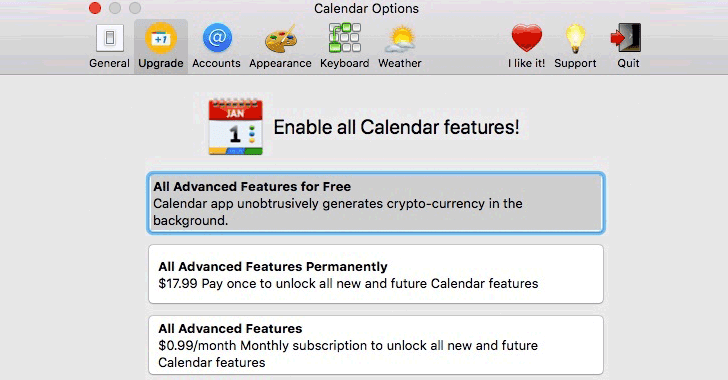Mac Software Mines Cryptocurrency in Exchange for Free Access to Premium Account
Nothing comes for free, especially online.
Would you be okay with allowing a few paid services to mine cryptocurrencies using your system instead of paying the subscription fee?
Most free websites and services often rely on advertising revenue to survive, but now there is a new way to make money—using customers' computer to generate virtual currencies.
It was found that a scheduling app, dubbed Calendar 2, was embracing cryptocurrency mining in exchange for free access to its app premium features, but the developer has to take it down from the Apple App Store following reports that it's not working as intended.
Cryptocurrency mining is not a new concept, but the technology has recently exploded after hackers found it a great way to make millions of dollars by hijacking computers to secretly perform cryptocurrency mining in the background without users' knowledge or consent.
Due to this cryptocurrency mining has emerged as one of the biggest threats in recent months, raising negative sentiments towards this alternative revenue scheme.
However, it seems that Apple has no problem with this alternative if app developers take user's consent to mine cryptocurrencies.
Developed by Qbix, Calendar 2 includes more features than the regular Calendar app that comes bundled with macOS, and cost $0.99 per month or $17.99 one-time fees via in-app purchases.
However, the app recently included a default feature that unlocks 'advanced' paid features of Calendar 2 by allowing the app to mine the digital currency known as Monero (XMR) for its developer in the background.
But unfortunately, the app contains two serious bugs: one that kept the Monero miner running, even if users tried to opt-out of the default setting, and a second issue that caused the miner to consume more CPU duty cycle than originally intended.
"It ate 200% CPU until I found it and killed it. I didn't expect a miner infection from an App Store vendor. Wow. It runs the xmr-stak Monero miner," one user on Twitter reported.
In response to the reports, Qbix founder Gregory Magarshak acknowledged the issues and decided to remove the mining function from his app, citing some issues with the miner's source code, the feature's buggy launch and a personal dislike for "proof of work" computing.
Even though the miner is removed from Calendar 2, it's unclear whether the cryptocurrency mining within apps breaches App Store terms of service, as Calendar 2's method of openly embracing mining in exchange of paid services is new to the Mac App Store.
Would you be okay with allowing a few paid services to mine cryptocurrencies using your system instead of paying the subscription fee?
Most free websites and services often rely on advertising revenue to survive, but now there is a new way to make money—using customers' computer to generate virtual currencies.
It was found that a scheduling app, dubbed Calendar 2, was embracing cryptocurrency mining in exchange for free access to its app premium features, but the developer has to take it down from the Apple App Store following reports that it's not working as intended.
Cryptocurrency mining is not a new concept, but the technology has recently exploded after hackers found it a great way to make millions of dollars by hijacking computers to secretly perform cryptocurrency mining in the background without users' knowledge or consent.
Due to this cryptocurrency mining has emerged as one of the biggest threats in recent months, raising negative sentiments towards this alternative revenue scheme.
However, it seems that Apple has no problem with this alternative if app developers take user's consent to mine cryptocurrencies.
Developed by Qbix, Calendar 2 includes more features than the regular Calendar app that comes bundled with macOS, and cost $0.99 per month or $17.99 one-time fees via in-app purchases.
However, the app recently included a default feature that unlocks 'advanced' paid features of Calendar 2 by allowing the app to mine the digital currency known as Monero (XMR) for its developer in the background.
But unfortunately, the app contains two serious bugs: one that kept the Monero miner running, even if users tried to opt-out of the default setting, and a second issue that caused the miner to consume more CPU duty cycle than originally intended.
"It ate 200% CPU until I found it and killed it. I didn't expect a miner infection from an App Store vendor. Wow. It runs the xmr-stak Monero miner," one user on Twitter reported.
In response to the reports, Qbix founder Gregory Magarshak acknowledged the issues and decided to remove the mining function from his app, citing some issues with the miner's source code, the feature's buggy launch and a personal dislike for "proof of work" computing.
Even though the miner is removed from Calendar 2, it's unclear whether the cryptocurrency mining within apps breaches App Store terms of service, as Calendar 2's method of openly embracing mining in exchange of paid services is new to the Mac App Store.
Have something to say about this article? Comment below or share it with us on Facebook, Twitter or our LinkedIn Group.
